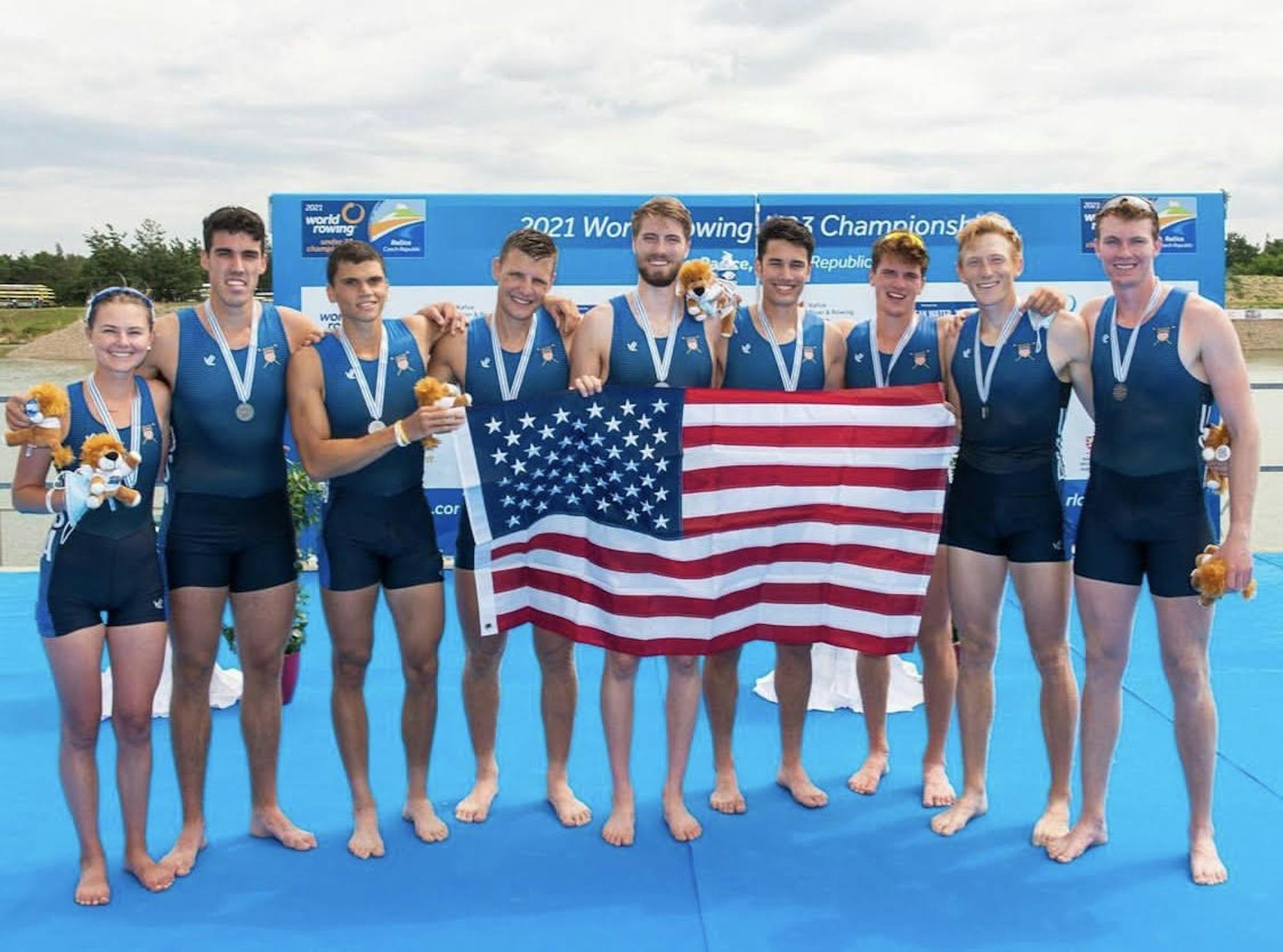Three heavyweight rowers and four lightweight rowers from Dartmouth represented the U.S. and Canada in the World Rowing Under-23 Championships this past weekend in Racice, Czech Republic.
In the lightweight quadruple sculls event, Jack Stone ’23, Chris Stich ’23, Cooper Tuckerman ’22 and Sean Ward ’21 rowed in the A-final race and earned sixth place with a time of 6:09.17. Among the heavyweight rowers, Liam Keane ’21 rowed for his home country of Canada and brought home gold in the men’s four with a winning time of 5:56.58. Jacob Hudgins ’23 and Bill Bender ’24 were in the men’s eight boat and helped secure a silver medal for the U.S.
“To be selected to represent your country at the U23 World Championship is a significant accomplishment. To win medals is awesome,” heavyweight rowing head coach Wyatt Allen wrote in an email statement.
According to Bender, athletes applied to qualify for the U23 World Championship in early spring with rowing scores and biometrics. The men’s eight was named after some of these athletes were invited to an elite selection camp in Boston, while the lightweight crew qualified through the U.S. Rowing U23 national team trials in Florida. The athletes flew to the Czech Republic on June 30 to prepare for the races. Due to the ongoing COVID-19 pandemic, the rowers adhered to strict policies in which they were limited to staying in their hotel in Racice when they weren’t racing.
The pandemic made for a tumultuous year in rowing. All athletes lost their spring season, and Dartmouth’s lightweight rowing program was cut in July 2020 before its reinstatement this January. In the midst of this uncertainty, these rowers trained around the country and found creative ways to stay at peak fitness.
“When we got the information about the trials event from [assistant coach Trevor Michelson], it was definitely a cool opportunity because we wanted to keep growing together,” Tuckerman said. “We didn’t know if we were going to be able to do that again after the College had cut the program. It’s definitely a real privilege.”
In January, the four lightweights set their sights on the World Championships and began to work toward their goal.
“They really got a good year’s worth of training and effort in,” lightweight rowing head coach Dan Roock said. “They built a lot of commitment and trust between them.”
In March, the lightweight rowers started living and training as a group based out of Stone’s house in Rhode Island before they were able to return to Hanover and train with Dartmouth coaches in the spring. The lightweight rowers accomplished a rare feat when they won at the U.S. Rowing U23 national team trials in Florida — they qualified for the World Championships with all members hailing from the same school.
“It is pretty atypical, particularly for a large boat like a quad, to be four guys from the same school,” Stone said.
The World Championships are the most competitive stage for rowers in this age division.
“When we’ve lined up for races in the past, it’s like ‘Oh, we’re lining up against Yale or a guy from a certain school,’” Stone said. “But when you line up against Germany and Italy, it’s a little bit different.”
Bender said that Dartmouth’s rowing program uniquely prepares athletes for success at a high level. Starting with access to the Connecticut River — which he described as one of the best places to practice in the country — to extreme winter temperatures that give athletes an edge of mental toughness, Dartmouth rowers are prepared for fast and competitive racing, Bender said.
“Races abroad are obviously really fast,” Bender said. “But it’s the same sport. You’re like, ‘yes, this hurts, but I’ve done it before and I can do it again.”’
On race day, in the heavyweight men’s four race, Keane’s boat with the Canadians pulled ahead of Ireland and Great Britain in the final 500 meters of the 2000-meter race to secure the gold.
In the men’s eight final, the U.S. was favored to win, as the team entered the finals with the fastest qualifying time. They came into the final sprint in the lead, but Great Britain pulled ahead and won by a fraction of a second.
Allen, who was watching from home in the U.S., wrote that he was “thrilled” for his athletes going into the race.
“What drove our team’s success this year, and this is certainly true of [Keane], [Hudgins] and [Bender], is that they enjoy training and the process of getting better, they like working hard, and they genuinely like each other,” Allen wrote. “The team has a good energy and vibe right now that makes it fun to head down to the boathouse and get to work every day.”
The lightweight quad also went out fast to keep up with the field, but the Dartmouth rowers didn’t have the endurance to hold the speed to the end, Roock said. The U.S. came in sixth, while Germany claimed gold in the event.
“They couldn’t keep the strength and endurance of these older athletes,” Roock said. “They gave it all they could muster, and that was awesome.”
Many rowers in this young group have more years ahead competing for Dartmouth — starting with the fall 2021 season, which kicks off in October.
“I’m excited to finish because we’ve been training a lot and we’ve had to sacrifice a lot to compete at the highest level at the World Championship,” Stich said. “But I’m kind of missing training already, having a purpose and something to commit to every day. Just having teammates and people that you’re working towards a common goal with – that’s my favorite part of the sport.”




